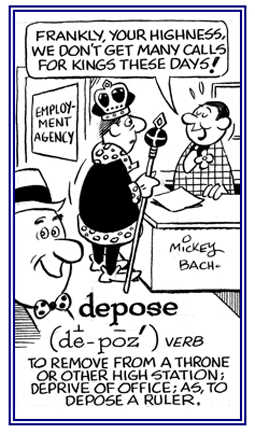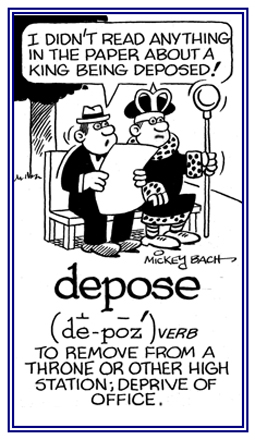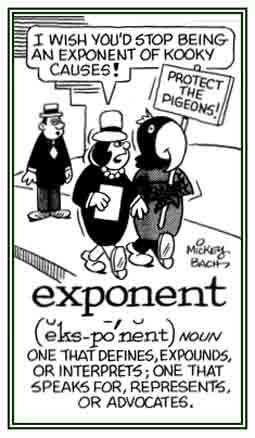pon-, posit-, pos-, -poning, -poned, -ponency, -ponent, -ponement, -pound
(Latin: to place, to put, to set; placement, positioning)
2. Anyone who gives written testimony to be used as evidence in a court of justice: The defense deponents each prepared sworn statements for the court.
2. To give evidence or to testify under oath, either in a written or verbal form: Under oath, the witness was deposing her evidence precisely and to the point.
3. To request and to record evidence from a testifier: The court was carefully deposing all of the statements from the attestant or person who affirmed the truth about what happened.


Go to this Word A Day Revisited Index
so you can see more of Mickey Bach's cartoons.
Jason's deposit was made after the commercial house closed and so it would be recorded in the morning.
2. A partial or initial payment of a cost or debt: Mary left a $300 deposit toward the purchase of a stereo system.3. A sum of money given as security for an item acquired for temporary use: Adam left a considerable sum as a deposit for the purchase of a new car.
4. Something left or lain down; especially, by a natural process; such as, the concentration of mineral matter or sediment in a layer, vein, or pocket: There were rich deposits of oil and natural gas in the area.
5. In physiology, an accumulation of organic or inorganic material; such as, a lipid or mineral, in a body tissue, structure, or fluid: Karl's legs were swollen because of the deposit of excess fluid in his muscles and tissues.
6. A sediment or precipitate that has settled out of a solution: There appeared to be a dark brown deposit at the bottom of the test tube.
7. A coating or crust left on a surface as a result of evaporation or electrolysis: There was a tough deposit on the finish of the old paint that was caused by evaporation.
2. To leave something somewhere for safekeeping: Hans and Gretel deposited their valuables in the hotel safe before they went out for the evening.
3. To pay money into an account in a bank or other financial institution: Darla deposited more cash into her savings account in the month of May than she did in April.
4. To give a sum of money as part-payment or security for something: Mr. and Mrs. Johnson deposited the minimum down payment to guarantee that they would get the car the following week.
5.In nature, to leave or to form a layer of sand, sediment, or other substance, as a gradual process in one place, or be left in this way: Christy and Susan could see the layers of silt deposited by the river.
Each of these terms can correctly be used to refer to a place where something is deposited or left for safekeeping.
A safe deposit box stored in a bank vault is a depository or a depositary.
The term depositary more often refers not to a place for safekeeping, but to a group or even an individual who is entrusted with the preservation of something.
The officers of a bank or the trustees of a museum, for instance, would more likely be depositaries instead of depositories.
2. A process in which layers of a substance have formed gradually over a period of time; especially, matter by a natural process: The cut in the road revealed several depositions of soil that had been laid down over the centuries.
3. Something that has been placed in a safe, secure place; such as, in a safe or in a bank: Helena made sure that the deposition of the company payroll was properly completed.
4. In law, a testimony under oath; especially, a statement by a witness that is written down or recorded for use in a court of law at some later date: The lawyer, Mr. Clint, met with Steven, his client, in the hospital in order to take his deposition for the upcoming court appearance he would attend when he was physically able to do it.
2. A station where transport vehicles load or unload passengers or goods: Ted's mother went to the bus depot so she could welcome her sister who was coming to visit.
3. A storage installation for military equipment and supplies: There was an ammunition depot located at the far side of the training base.
2. Displacement to the right; such as, a body part: Tony, the pianist, favored the dextroposition of his hands when he was playing his special musical presentation.
2. An electric device installed below a kitchen sink that grinds garbage so it can be flushed away: The restaurant's garbage disposal was an efficient method for getting rid of ingredients that were no longer useful for the preparations of meals.
3. Having the freedom or legal right to use or to keep something: There is money in the credit union that is at John's disposal to utilize as he desires.
4. Final placement or destruction of toxic, radioactive wastes, pesticides, or other chemicals: The site for toxic refuse disposal is located in the country and the nearby rural population is very upset about such disposals.
Various kinds of disposals are done by using landfills, surface impoundments, land farming, deep-well injection, ocean dumping, incinerations, etc.
2. To put (business affairs, for example) into correct, definitive, or a conclusive form: James disposed his assets and property in a conscientious manner.
3. To put into a willing or receptive frame of mind: Irene's teacher is well disposed to think highly of the music of J. S. Bach.
4. To transfer or part with, as by giving or selling something: Gary decided to dispose of his antique car when he retired.
5. To get rid of; to throw out: Some people dispose of the most astonishing household objects; such as, good mirrors, furniture, etc.
2. An act of getting rid of something or giving it to another person: The disposition of Uncle Jim's property was easily accomplished.
The safe disposition of toxic refuse is highly contested in some neighborhoods.
3. An attitude of mind especially one that favors one alternative over others: Mayor Nelson's disposition on the topic of waste management was to expand the land fill sites.Some animals and humans have sweet or sour dispositions, or personalities; and some of them also share the disposition to eat greedily, to yawn loudly, or to run around making odd noises.
4. A final settlement: The court made a final disposition of the deceased's property to specific relatives.2. A substance that remains by using electrolysis: The electrodeposit of silver on the antique lamp base was glowing brightly in the light from the display case.
Iris and Ted in the advanced chemistry program studied the electrodeposition or electrolytic deposition of various metals and base metals.
2. Anyone who speaks for, represents, or advocates: Senator S. is an exponent for getting out of the war as soon as possible.
3. A person or thing that is a representative, an advocate, a type, or a symbol of something: Abraham Lincoln is considered to be an exponent of American democracy.
4. A performer or practitioner of an art or skill; especially, someone who is regarded as an excellent example of how something should be done: Mozart is an outstanding exponent of classical music and opera.
5. In mathematics, a number that is placed above and to the right of a another number in order to show how many times it should be multiplied by itself: The exponent of 5 in 65 shows the number of times that 6 should be multiplied by itself; that is, 6 X 6 = 36 X 6 = 216 X 6 = 1,296 X 6 = 7,776 X 6 = 46,656.



Go to this Word A Day Revisited Index
so you can see more of Mickey Bach's cartoons.
Related word families intertwined with "to place, placing, to put; to add; to stay; to attach" word units: fix-; prosth-; stato-; the-, thes-.


